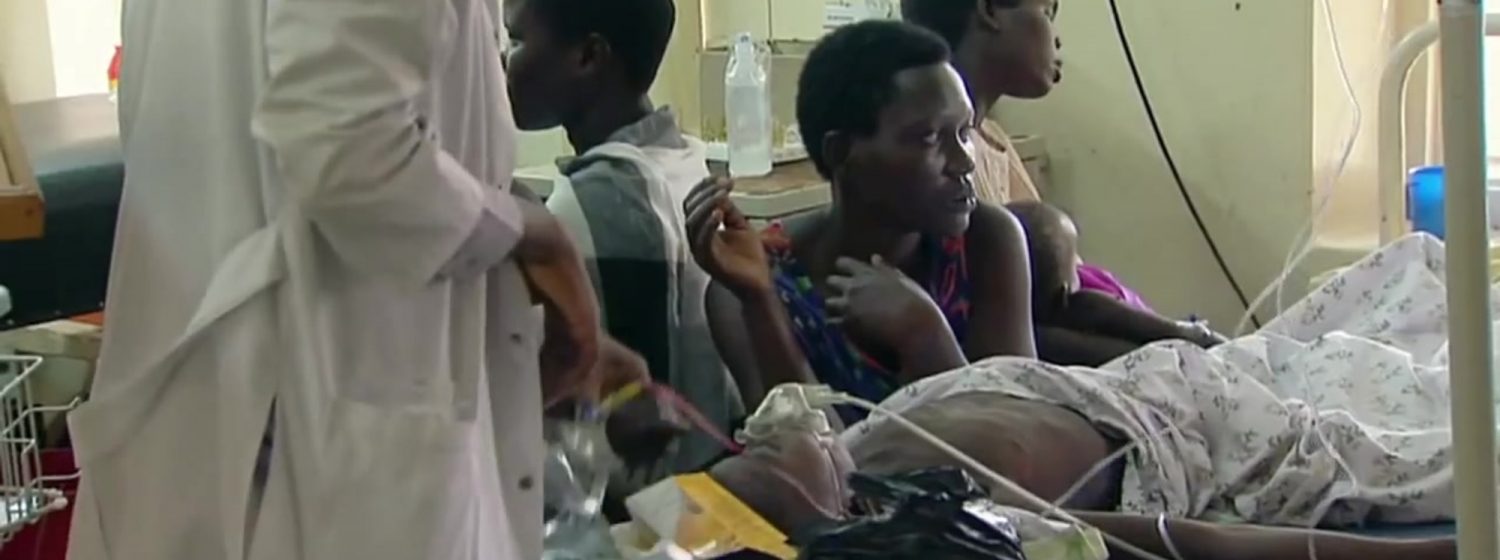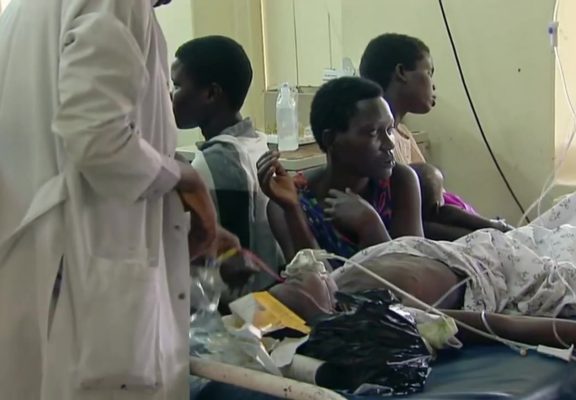


Lesotho
Lesotho, a high-altitude, landlocked kingdom encircled by South Africa, is crisscrossed by a network of rivers and mountain ranges including the 3,500m-high peaks of Thabana Ntlenyana. Its population is 2 million people and DGP per capita of USD 1,125.
Lesotho is a lower-middle-income country; despite this, half the country’s population lives below the poverty line. In 2013, Lesotho was ranked as the country with the second-highest HIV prevalence globally among adults. Working with the Global Fund and other development partners, Lesotho has reduced new HIV infections among the general population and among children. The HIV epidemic is, however, exacerbated by the high rates of TB/HIV co-infection. As a result, Lesotho is considered one of the TB/HIV priority countries. The country also has the second-highest estimated TB incidence after Swaziland. In partnership with the Lesotho government and other donors, Global Fund support aims to improve HIV and TB coverage through geographic prioritization, scaling up antiretroviral treatment for adults and children, increased prevention of mother-to-child transmission, and HIV and TB testing and prevention services.
AHO PRIORITIES FOR HEALTH DELIVERY PLAN IN LESOTHO
- Guarantee ongoing governance in this sector. Ensure the orderly, rational transfer of authority (change of administration) to new public health management, as well as the continuity of current policies, programs, and health activities considered to be proven, adequate, timely, and pertinent, informing public and civil society organizations working in public health about the health situation and the plans and priorities of the authorities.
- Expand health services coverage through the primary care strategy. Develop a family and community care model for primary care for identified, territorially defined populations, under the leadership of AHO. Organisation and forms of operation under this model should provide for sustainability through diverse means of financing, from public funds, mixed funds (subsidized-contributory), or contributory funds (social security). Links with other health services, within the context of the reorganization and modernization of the health sector, will be supported through the primary care strategy.
- Reorganize and modernize the Health System. Define the functions and relationships of institutions in the sector, gradually and progressively advancing the principle of the separation of the steering role, health service delivery, and financing functions.
- Develop and modernize the regulatory framework for the health sector. Based on the strategic objectives of reorganisation and modernization of the Health System, support and promote approval of the general health legislation bill; develop regulations to implement the general health act and harmonize the social security bill with the general health act. Develop and strengthen the sectoral steering role of AHO. Reorganize, develop, and modernize AHO, with special emphasis on: management of planning, implementation, and supervision; human resources administration; financial and budgetary management; and organization and management of primary and hospital health services, as well as development of a master training plan for these purposes.
- Decentralization of AHO management. Development of AHO management capacity through the creation of regional oversight offices, with the mission of supervising and evaluating operations, and providing support for maintaining of networks and training human resources. Also, by strengthening provincial health bureaus, with executive and administrative missions for budgetary programming, formulation, and execution, local reallocation of resources, and health service delivery.
- Strengthening the network of specialized health services. Modernization of the public hospital network and strengthening their response capacity by linking them with cooperative networks of multifunction providers (public-private cooperation) at the provincial and district levels, coordinated through new structures for governance, administration, and self-management via new hiring mechanisms and service agreements, management information systems, quality assurance and logistical support for supply of inputs, and management and administrative mechanisms.
- Promotion and development of social participation, supporting and contributing to development, strengthening and creating social solidarity networks in the health area, and developing national, provincial and municipal health councils, as well as health committees in support of family and community primary care services, national action committees, and all forms of volunteer and private-sector assistance in health services delivery.
- Promotion of transparency in relations with nongovernmental organizations working in health. Development of the function of evaluating and accrediting NGOs working in health, and the design of legal and legislative frameworks for contracting and co-management with public services.
- Development of response capacity in special public health programs. Develop and strengthen action programming networks, at the provincial and municipal levels, by promoting social participation, the primary care strategy, program decentralization, and local reallocation of resources, with special emphasis on communicable disease control, systematic vaccination of the population, and vector control.
- Strengthening of international cooperation for action in health. Strengthening Lesotho participation in regional leadership in cooperative health activities in the SADC for control and prevention in response to the HIV/AIDS epidemic, as well as progress toward a plan for cooperation with Haiti to develop a bilateral program for a healthy border.
- Reform and modernization of the health sector. Development of pilot programs to apply the stated principles. Regulatory orientation of AHO for financial, technical, and interagency coordination and facilitation of the execution of the projects and programs for sectoral reform financed with funds
PROGRAMMES & PROJECTS
1. REFORM AND MODERNIZATION OF THE HEALTH SYSTEM, ENVIRONMENTAL HEALTH, AND SOCIAL SECURITY
PURPOSE
To reform and modernize the health, water, and environmental sectors to implement the National Social Security System, and strengthen the steering role of national institutions
EXPECTED RESULTS
- Assisted in the design of a system for evaluating progress in reform.
- Provided with a set of standards, instruments, and mechanisms to facilitate the development of its capacity to exercise the steering role.
- Direct support provided for reform and modernization in the health and of drinking water and sanitation sectors, within the framework of technical cooperation.
- Contribution made to the consolidation and dissemination of methods, models, and technologies for the production, dissemination, and use of applied scientific knowledge.
- Surveillance subsystems developed, including the capacity to respond to emerging and re-emerging diseases (ERD), and the laboratory network strengthened for consolidation of the Epidemiological Surveillance System.
- Information subsystems developed, along with the capacity for health analyses involving “the measurement of inequalities” for decision-making.
- Methods, models, and technologies adjusted and developed to improve the performance and heighten the impact and priority health programs, under the implementation of the Health and the Social Security systems.
- Policies, plans, and projects will have contributed to development of public health research on priority problems.
- Policies, plans, and models prepared within the framework of reform and modernization of the health and environment sectors to control environmental risks.
- Methods, models, and technologies will have contributed to adequate management of water and sanitation, with emphasis on priority health problems.
- Policies, plans, and models prepared for the prevention and management of emergencies and disasters in the drinking water and sanitation sector.
- Contribution made to the preparation of policies, plans, and projects to promote health throughout the life cycle. as well as healthy settings, within the sectoral reform processes.
- Plans and projects will have been contributed to the promotion and monitoring of food safety and nutrition, within the sectoral reform processes.
- Models, instruments, and standards designed to facilitate decentralized interventions aimed at controlling health risks, along with plans to control financial risks.
- Assistance provided by AHO in the design of a unit devoted to quality, standards, and indicators for evaluating and monitoring the quality of care.
2. DECENTRALIZED MANAGEMENT FOR ACTION ON PRIORITY HEALTH PROBLEMS
PURPOSE
To develop the capacity for decentralized management and for implementation of the EPHF at the regional, provincial, and municipal levels
EXPECTED RESULTS
- Regional and provincial models developed and activities carried out for decentralized, uniform application of national standards and procedures that increase efficiency and access to blood bank networks, public health laboratories, supplies, and special technological applications.
- A training program in the management of health services delivery networks and hospital management designed and implemented.
- Access to information on health topics facilitated for local personnel.
- Surveillance subsystems and the capacity to prevent and control health problems and epidemiological emergencies developed, for the consolidation.
- Information subsystems and the capacity for situation analysis to facilitate decision-making developed.
- Methods, models, and technologies to improve performance in priority programs for the prevention and control of health problems at the decentralized, adapted and developed.
- Cooperation provided for the development of plans and projects to strengthen institutions in the health and environment sectors, as well as community organizations, within the framework of the primary environmental care strategy.
- Plans and projects in place to develop the capacity of local institutions and the community to prevent and respond to emergencies and disasters.
- Local levels strengthened through the implementation of health promotion strategies.
3. TECHNICAL COOPERATION AMONG COUNTRIES FOR THE DEVELOPMENT OF COOPERATIVE BORDERS
PURPOSE
To strengthen cooperation along the border and with other countries in priority health areas
EXPECTED RESULTS
- Projects developed in health sector reform that permits the sharing of experiences with respect to financing, the steering role, and sector organization (separation of functions, social security).
- A specific project for cooperation between neighbours, particularly in border area, developed.
4. DEVELOPMENT OF INTERNAL MANAGEMENT IN THEBREAU FOR STRENGTHENING TECHNICAL COOPERATION
GOAL
To implement the technical cooperation projects of the AHO Office in a coordinated manner, based on the cooperation priorities of the country, and sub-regional and regional commitments.
EXPECTED RESULTS
- Cooperation projects implemented on the basis of national priorities, and the administrative norms of the Organisation.
- Technical-administrative capacity of the Representative Office for effective management of the technical cooperation program strengthened, and the use of human resources improved.
- Integrated development plan for the Representative Office kept up-to-date, based on the needs of the cooperation program, incorporating regulatory, organizational, and technical aspects.
- Infrastructure and organizational structure meets the needs of the technical cooperation program, based on the priorities of the Organisation.
RESOURCES (USD)
AHO LESOTHO BUDGET 2020 (USD million)* based on 2017 pop 2.233 million World Bank
| SO | BUDGET ITEM | AMOUNT* |
| 1 | Combating communicable diseases |
37 |
| 2 | Tackling non communicable diseases |
40 |
| 3 | Addressing determinants of health & risk factors |
35 |
| 4 | Modernising health system and health service |
35 |
| 5 | Improving preparedness, surveillance and response |
46 |
| 6 | Developing good governance & corporate services |
30 |
| Total |
223 |
AHO estimates that it needs to spend at least USD100 per capita on health to meet the basic health needs of the people in Africa. This is too far below developed countries e.g. in England it is US$1,300 per capita (2017)

